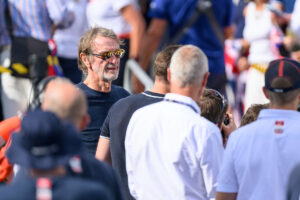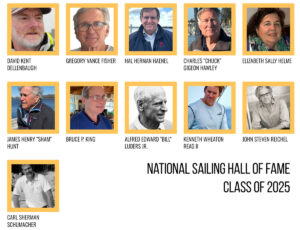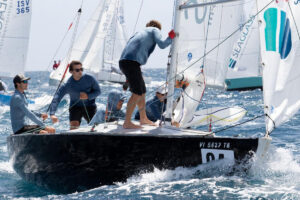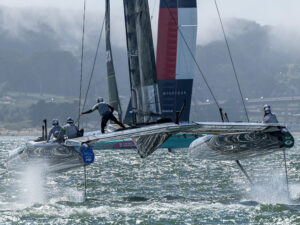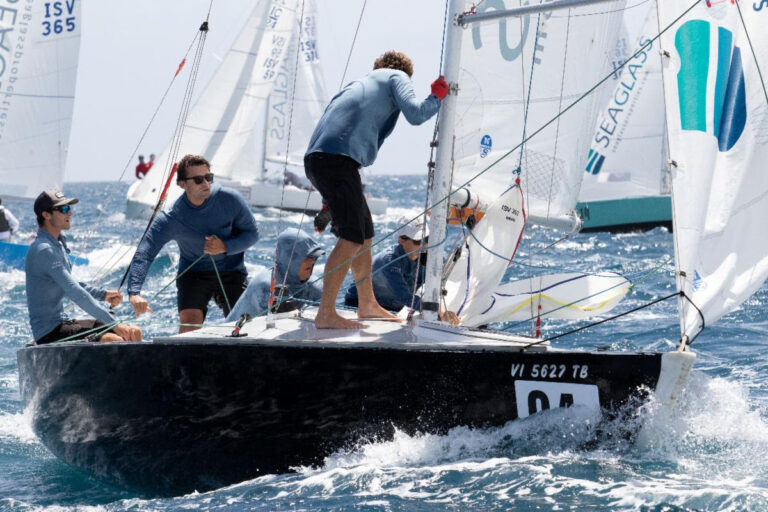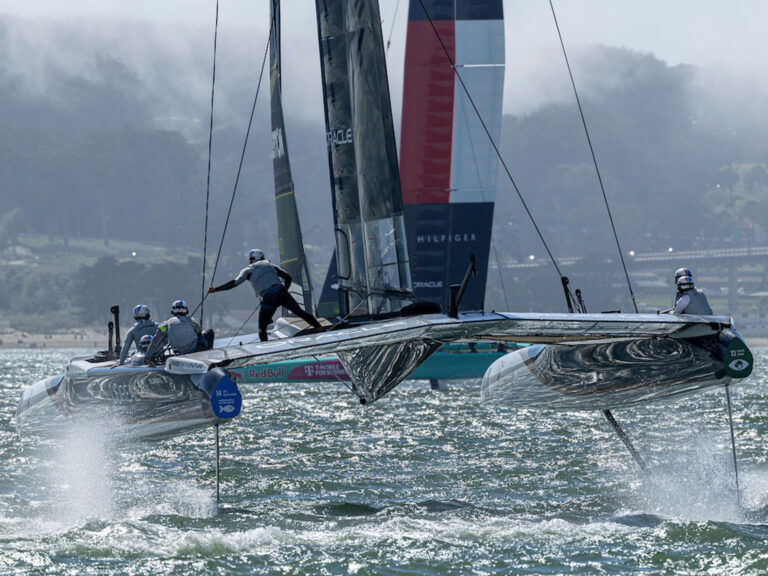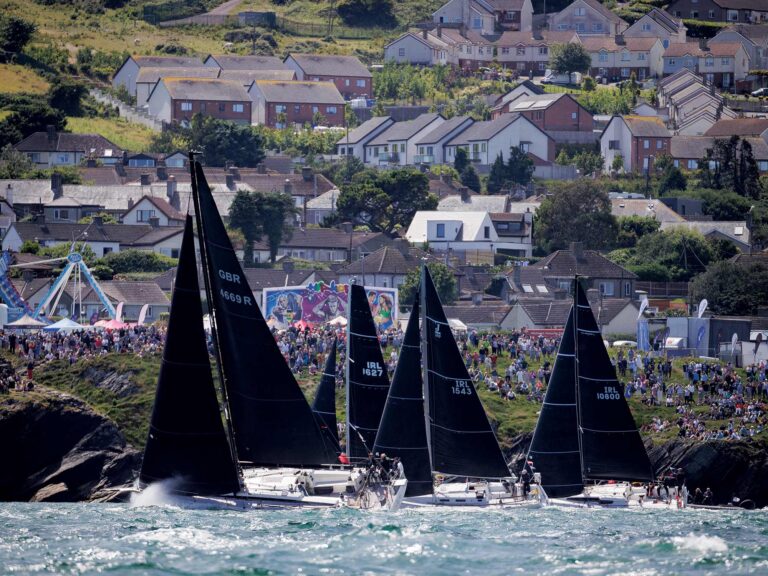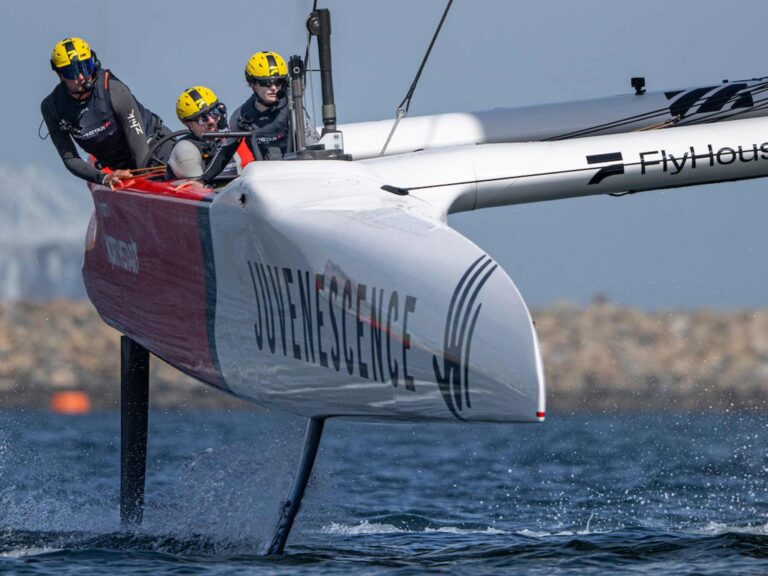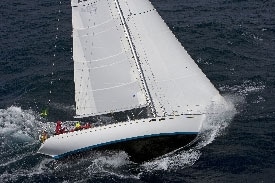
Love & War
The following is provided by www.regattanews.com
December 30-Prolonged upwind conditions experienced in the 2006 Rolex Sydney Hobart have resulted in one of the races most classic entries taking handicap honors. This afternoon at a dockside ceremony at Hobart’s Constitution Dock, Geoff Lavis, Commodore of the Cruising Yacht Club of Australia, organizer of the Rolex Sydney Hobart Yacht Race presented the coveted Tattersalls Cup to this year’s winner, Lindsay May and his nine strong crew on the yacht Love & War.
One of the most beautiful boats in the race, Love & War is a Sparkman & Stephens 47- footer, built in 1973 for owner Peter Kurts. In a long, impressive career the boat was overall winner of the Sydney Hobart race in 1974 and 1978 and represented Australia in the Admiral’s Cup in 1975. In her prime, she won most of the principle offshore races along Australia’s east coast. Love & War is typical of her era, with ‘tumblehome’ (where the beam of the boat is wider below the deck rather than at the deck level), a pointed bow and stern and she still is very ‘original’ with swaths of varnished teak down below, giant stainless steel winches, Tufnol blocks, an alloy rig – all massive bulletproof gear, typical of her vintage. The only acknowledgement of the 21st century is in her instruments.
“In 2004 we added B&G instruments and Peter couldn’t get over that the instruments cost as much as the hull cost when the boat was built,” said May with a smile of nostalgia. Aged 80, Peter Kurts died in January 2005, the same day as Love & War sailed back into Sydney from the end of the 2004 Rolex Sydney Hobart. Love & War remains in the Kurts family, but son Simon was unable to sail this year and lent the boat to May who competed with many of his old colleagues from the famous Sydney maxi, Brindabella.
The annual Rolex Sydney Hobart is a race where competitors are proud of the number of times they have entered and between the ten Love & War crew this year they had 132 Hobart races, making them one of the most experienced in the race. The crew included Brindabella owner George Snow, sailing on board Love & War on this occasion as cook. “More fun, less responsibility – it is an important job on a boat,” joked Snow, who is renown for the ‘Brindabella breakfast’, where the usual features are liberally enhanced with Tabasco. Aside from canny tactics, one of the reasons for Love & War’s success is her typical 1970s hull shape and her heavy displacement – both features are very good for sailing upwind, which represented 90% of conditions in this year’s race.
“Upwind under this handicap this boat will sail above its handicap consistently. Downwind – no, it is not happy,” admits May. Snow compared her to the modern race boats surrounding her on the dock in Hobart: “It is a heavier boat and not as heavily canvassed, and so not as dynamic. But it is beautiful boat, it goes up and down the waves, it doesn’t bang and slam, it is a very easy boat to sail.”
While the modern lightweight boats headed inshore, Love & War made a beeline for the lumpy conditions offshore, where the south-going current was fighting the wind from the south creating a sharp, highly uncomfortable sea state. “We just went out to sea,” said May. “Then we hooked into this incredible current, 4.5 knots.” Typically the current here is 2 or 2.5 knots.
They stayed offshore across the mouth of Bass Strait, where they also made good use of the current, playing favorable eddies to the full. Being east also put them into a good position to be able to head for Tasman Island without having to tack as much as the boats inshore. “Then we had favorable current all the way down the Tasmanian coast – 2.5 knots, which I have never ever seen,” said May. Love & War finished at 09:17 this morning, taking 3 days, 20 hours, 17 minutes, and 24 seconds to complete the 628-mile passage, one of a torrent of boats that have been arriving in Hobart throughout today.
Shortly after midnight, Danilo Salsi’s DSK Comifin was 12th boat home, the immaculately turned out Italian Swan 45 taking the handicap win in Division C. “It was a nice race. A lot of upwind – too much,” said tactician and former America’s Cup and Volvo Ocean Race crewman, Pietro d’Ali. “The Swan 45 is a very good boat upwind and in the chop it is no problem. It was good conditions for the boat, but not for the body.” Like Love & War, DSK Comifin being a strong boat, had headed out into the current on the first night and done extremely well, maintaining an easterly position down the racetrack. However their luck ran out on the approach to Tasman Island when the wind dropped and the wind shifted causing to them to be pushed into the shore 60 miles up the coast.
“We are very happy,” continued d’Ali. “The boat was very well prepared but we didn’t think we would have so much upwind. But it is not a surfing boat, so downwind is a little bit tricky, so we were lucky to find good conditions for the boat.” From here DSK Comifin will be loaded back onto a ship bound for the Med and will compete in the Rolex Swan Europeans and the Rolex Fastnet Race this summer.
British skipper Chris Bull and the crew of his J/145 Jazz had a less than satisfactory Rolex Sydney Hobart. As Bull explained: “The first night was extremely tough, boat breaking conditions as we saw with other competitors and we did back off. We actually tacked back inshore to get out of the worst of the sea and that is not a move we would have made in terms of getting to Hobart as quickly as we could. We made it to protect the integrity of the boat and the safety of the crew. So that put us on the back foot at the start of the race and we were playing catch up after that.”
Offshore, the faster lighter weight, American-built yacht had been launching off waves, then landing with an enormous impact. “We knew the sea would be gnarly out there but we didn’t realize quite how bad it would be. In fact it proved to be a bit more than we thought we could safely ask the boat to take,” said Bull. “We had several people seasick which made it difficult to sail the boat efficiently and we just judged that if we carried on launching off waves like that for several more hours we couldn’t be sure the boat would cope with it.” Bull was hoping for more reaching conditions that have suited Jazz so well in offshore races in the past. “We had some spinnaker work at the end which is where we managed to pull back some time. If we’d had the spinnaker up half way through I would have fancied us still to get some good honors, but as it was it was a bit too late.”
Despite this, navigator Mike Broughton took them on an easterly route and they faired well from this tactic, arriving 16th into Hobart and finishing third under handicap in Division C. Crewman and triple Olympic medalist Rodney Pattisson, one of Jazz’s helmsmen, was pleased to have evened his score of Rolex Sydney Hobarts, having now finished three out of six. “This was an easy one, except most of it was on the wind. We only had one hard bashing one night and normally you get a lot worse seas.” At 19.00 there were still 13 yachts left to reach Hobart, however none of these can now finish in a time fast enough to beat Love & War.
For more information about the Rolex Sydney Hobart Yacht Race 2006 including updated position reports (every 10 minutes) visit www.rolexsydneyhobart.com

